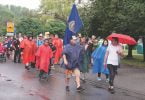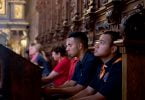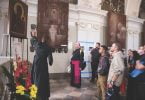by Katie Hyde
Special to The Leaven
As any veteran World Youth Day pilgrim will tell you, traveling across the globe with millions of other people is an lesson in patience.
That lesson was frequently underscored in Poland, where long lines, longer bus rides and endless crowds all tested the sunny dispositions of the Kansan pilgrims.
One group of pilgrims, for example, spent nearly four hours walking to an event that was less than three miles away.
Another group got helplessly lost in Krakow and spent hours wandering the city looking for somewhere familiar.
A number of weary pilgrims waited nearly three hours in a line for food rations after having hiked nearly 10 miles in one day, only to learn that the food had run out.
Poor choices in footwear led to aching legs and cringe-worthy blisters. And Krakow’s incessant rain showers seemed perfectly timed to drench the archdiocesan group.
Even the most athletic of pilgrims is still, even now, recovering from the extreme physical demands of the journey.
But as all of the pilgrims found during the journey, there is a moment in which the trials and exhaustions stop being a pain in the neck and start being, well, funny. Even grace-filled.
“Even though there are so many crowds, everyone is happy,” said Sarah Jo Schwinn, a student at Maur Hill-Mount Academy in Atchison. “You find a new patience here. You’re happy because you’re all here for Jesus.”
Along with the trials of the pilgrimage came a new appreciation for the comforts of home.
“[When I get home], I will appreciate the little things: water, food, transportation, shelter and quiet,” said Tamara Walters, a parishioner of St. Paul Church in Olathe who attended World Youth Day with her son.
“The vigil was so hard. The walk was long and hard,” she continued. “They didn’t have plain water and it was so hot.
“Yet, all around us, you could see people with love and joy, following and worshiping Jesus. It was so beautiful.”
For some, the arduous hikes and food shortages were reminiscent of Pope Francis’ call for solidarity with the millions of the world’s refugees and internally displaced people.
“I grew immensely in solidarity and understanding of others’ cultures and social and political situations,” said Helen Rhodes, a parishioner of Prince of Peace in Olathe. “Through the painful food line, I felt the pain of refugees.
“Through hunger, I felt for the poor. Through the language barriers, I felt loneliness.”
“I no longer feel like a completely ignorant American because these experiences taught me on a very tiny scale what it means to be human around the world,” concluded Rhodes.






